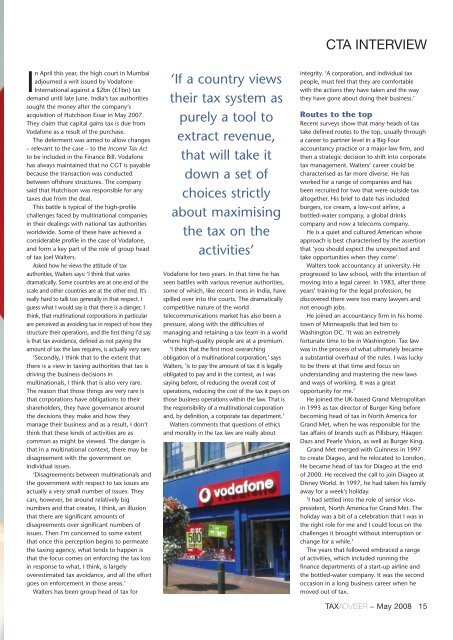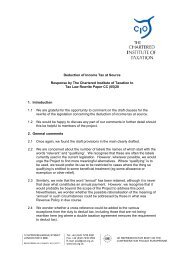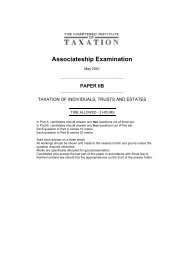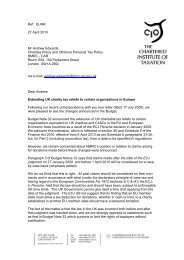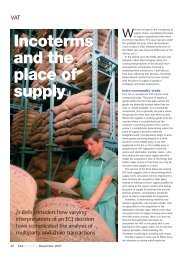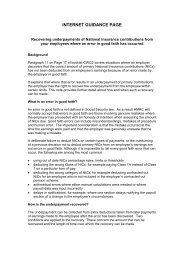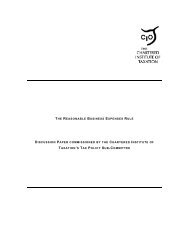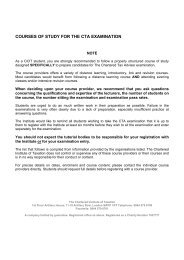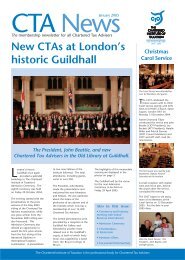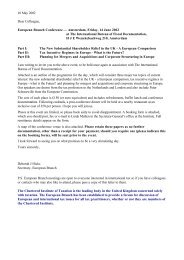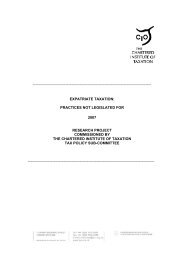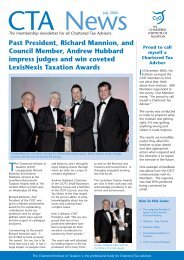CTA INTERVIEW Vodafone's group head of tax Joel Walters can ...
CTA INTERVIEW Vodafone's group head of tax Joel Walters can ...
CTA INTERVIEW Vodafone's group head of tax Joel Walters can ...
Create successful ePaper yourself
Turn your PDF publications into a flip-book with our unique Google optimized e-Paper software.
<strong>CTA</strong> <strong>INTERVIEW</strong>In April this year, the high court in Mumbaiadjourned a writ issued by VodafoneInternational against a $2bn (£1bn) <strong>tax</strong>demand until late June. India’s <strong>tax</strong> authoritiessought the money after the company’sacquisition <strong>of</strong> Hutchison Essar in May 2007.They claim that capital gains <strong>tax</strong> is due fromVodafone as a result <strong>of</strong> the purchase.The deferment was aimed to allow changes– relevant to the case – to the Income Tax Actto be included in the Finance Bill. Vodafonehas always maintained that no CGT is payablebecause the transaction was conductedbetween <strong>of</strong>fshore structures. The companysaid that Hutchison was responsible for any<strong>tax</strong>es due from the deal.This battle is typical <strong>of</strong> the high-pr<strong>of</strong>ilechallenges faced by multinational companiesin their dealings with national <strong>tax</strong> authoritiesworldwide. Some <strong>of</strong> these have achieved aconsiderable pr<strong>of</strong>ile in the case <strong>of</strong> Vodafone,and form a key part <strong>of</strong> the role <strong>of</strong> <strong>group</strong> <strong>head</strong><strong>of</strong> <strong>tax</strong> <strong>Joel</strong> <strong>Walters</strong>.Asked how he views the attitude <strong>of</strong> <strong>tax</strong>authorities, <strong>Walters</strong> says: ‘I think that variesdramatically. Some countries are at one end <strong>of</strong> thescale and other countries are at the other end. It’sreally hard to talk too generally in that respect. Iguess what I would say is that there is a danger, Ithink, that multinational corporations in particularare perceived as avoiding <strong>tax</strong> in respect <strong>of</strong> how theystructure their operations, and the first thing I’d sayis that <strong>tax</strong> avoidance, defined as not paying theamount <strong>of</strong> <strong>tax</strong> the law requires, is actually very rare.‘Secondly, I think that to the extent thatthere is a view in <strong>tax</strong>ing authorities that <strong>tax</strong> isdriving the business decisions inmultinationals, I think that is also very rare.The reason that those things are very rare isthat corporations have obligations to theirshareholders, they have governance aroundthe decisions they make and how theymanage their business and as a result, I don’tthink that these kinds <strong>of</strong> activities are ascommon as might be viewed. The danger isthat in a multinational context, there may bedisagreement with the government onindividual issues.‘Disagreements between multinationals andthe government with respect to <strong>tax</strong> issues areactually a very small number <strong>of</strong> issues. They<strong>can</strong>, however, be around relatively bignumbers and that creates, I think, an illusionthat there are signifi<strong>can</strong>t amounts <strong>of</strong>disagreements over signifi<strong>can</strong>t numbers <strong>of</strong>issues. Then I’m concerned to some extentthat once this perception begins to permeatethe <strong>tax</strong>ing agency, what tends to happen isthat the focus comes on enforcing the <strong>tax</strong> lossin response to what, I think, is largelyoverestimated <strong>tax</strong> avoidance, and all the effortgoes on enforcement in those areas.’<strong>Walters</strong> has been <strong>group</strong> <strong>head</strong> <strong>of</strong> <strong>tax</strong> for‘If a country viewstheir <strong>tax</strong> system aspurely a tool toextract revenue,that will take itdown a set <strong>of</strong>choices strictlyabout maximisingthe <strong>tax</strong> on theactivities’Vodafone for two years. In that time he hasseen battles with various revenue authorities,some <strong>of</strong> which, like recent ones in India, havespilled over into the courts. The dramaticallycompetitive nature <strong>of</strong> the worldtelecommunications market has also been apressure, along with the difficulties <strong>of</strong>managing and retaining a <strong>tax</strong> team in a worldwhere high-quality people are at a premium.‘I think that the first most overarchingobligation <strong>of</strong> a multinational corporation,’ says<strong>Walters</strong>, ‘is to pay the amount <strong>of</strong> <strong>tax</strong> it is legallyobligated to pay and in the context, as I wassaying before, <strong>of</strong> reducing the overall cost <strong>of</strong>operations, reducing the cost <strong>of</strong> the <strong>tax</strong> it pays onthose business operations within the law. That isthe responsibility <strong>of</strong> a multinational corporationand, by definition, a corporate <strong>tax</strong> department.’<strong>Walters</strong> comments that questions <strong>of</strong> ethicsand morality in the <strong>tax</strong> law are really aboutintegrity. ‘A corporation, and individual <strong>tax</strong>people, must feel that they are comfortablewith the actions they have taken and the waythey have gone about doing their business.’Routes to the topRecent surveys show that many <strong>head</strong>s <strong>of</strong> <strong>tax</strong>take defined routes to the top, usually througha career to partner level in a Big Fouraccountancy practice or a major law firm, andthen a strategic decision to shift into corporate<strong>tax</strong> management. <strong>Walters</strong>’ career could becharacterised as far more diverse. He hasworked for a range <strong>of</strong> companies and hasbeen recruited for two that were outside <strong>tax</strong>altogether. His brief to date has includedburgers, ice cream, a low-cost airline, abottled-water company, a global drinkscompany and now a telecoms company.He is a quiet and cultured Ameri<strong>can</strong> whoseapproach is best characterised by the assertionthat ‘you should expect the unexpected andtake opportunities when they come’.<strong>Walters</strong> took accountancy at university. Heprogressed to law school, with the intention <strong>of</strong>moving into a legal career. In 1983, after threeyears’ training for the legal pr<strong>of</strong>ession, hediscovered there were too many lawyers andnot enough jobs.He joined an accountancy firm in his hometown <strong>of</strong> Minneapolis that led him toWashington DC. ‘It was an extremelyfortunate time to be in Washington. Tax lawwas in the process <strong>of</strong> what ultimately becamea substantial overhaul <strong>of</strong> the rules. I was luckyto be there at that time and focus onunderstanding and mastering the new lawsand ways <strong>of</strong> working. It was a greatopportunity for me.’He joined the UK-based Grand Metropolitanin 1993 as <strong>tax</strong> director <strong>of</strong> Burger King beforebecoming <strong>head</strong> <strong>of</strong> <strong>tax</strong> in North America forGrand Met, when he was responsible for the<strong>tax</strong> affairs <strong>of</strong> brands such as Pillsbury, HäagenDazs and Pearle Vision, as well as Burger King.Grand Met merged with Guinness in 1997to create Diageo, and he relocated to London.He became <strong>head</strong> <strong>of</strong> <strong>tax</strong> for Diageo at the end<strong>of</strong> 2000. He received the call to join Diageo atDisney World. In 1997, he had taken his familyaway for a week’s holiday.‘I had settled into the role <strong>of</strong> senior vicepresident,North America for Grand Met. Theholiday was a bit <strong>of</strong> a celebration that I was inthe right role for me and I could focus on thechallenges it brought without interruption orchange for a while.’The years that followed embraced a range<strong>of</strong> activities, which included running thefinance departments <strong>of</strong> a start-up airline andthe bottled-water company. It was the secondoccasion in a long business career when hemoved out <strong>of</strong> <strong>tax</strong>.TAXADVISER – May 2008 15


